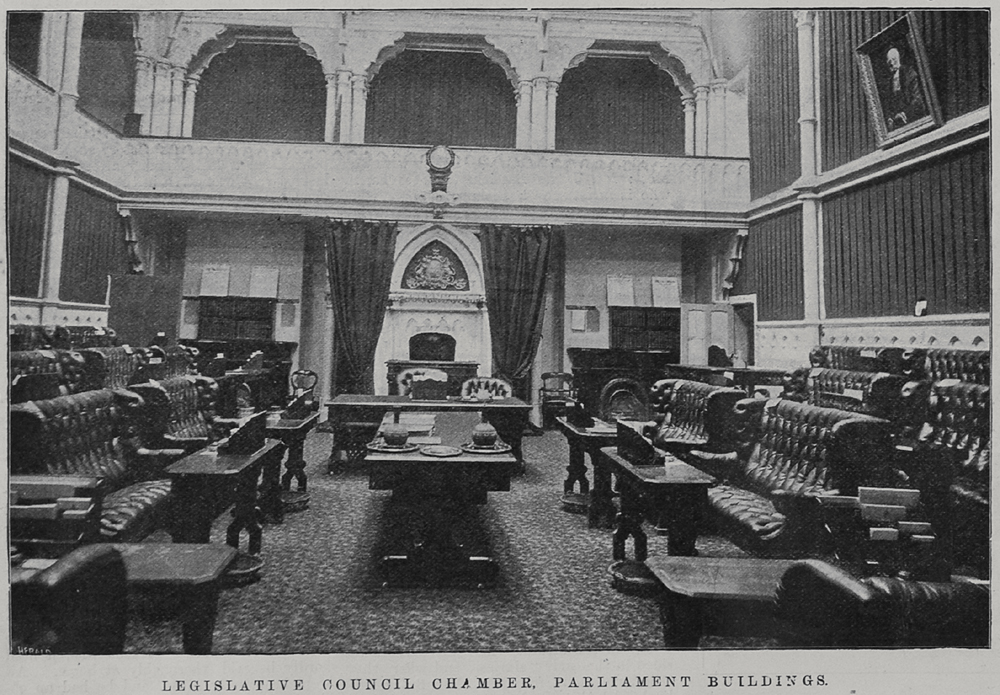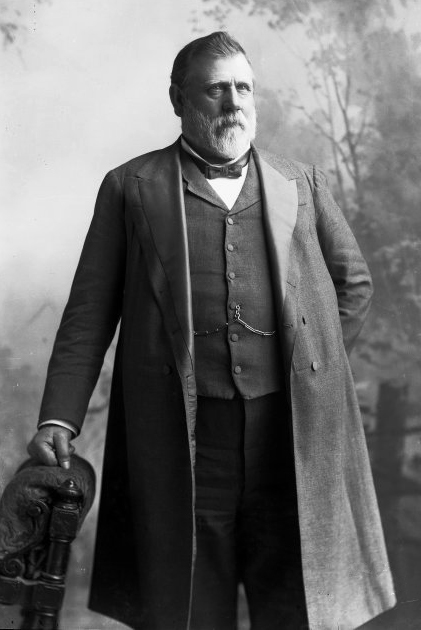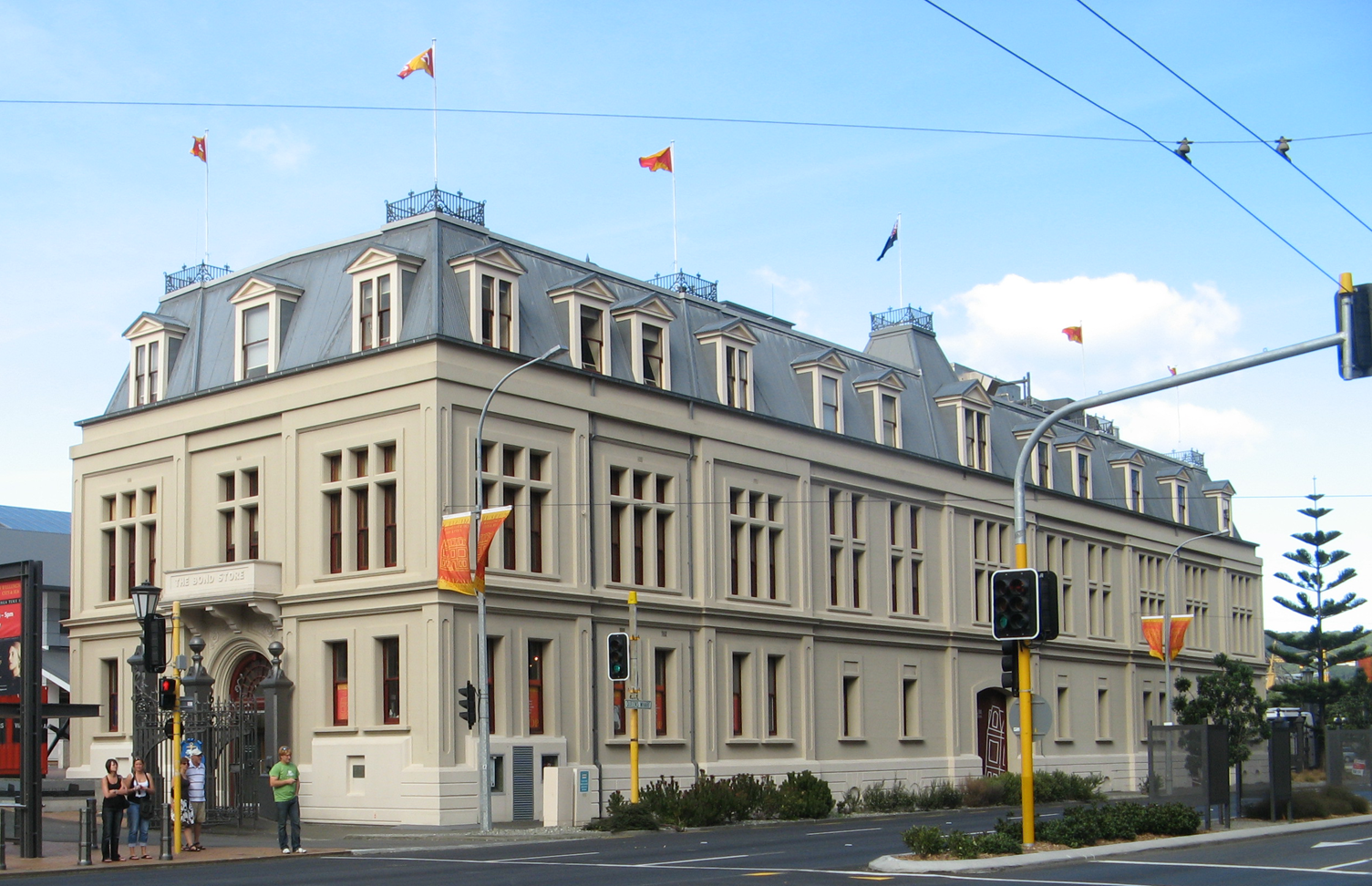|
John Duthie (politician)
John Duthie (28 February 1841 – 14 October 1915) was a politician and businessman in New Zealand. Originally from Scotland, he came to Auckland in 1863. He set up his own ironmongery in New Plymouth, then Wanganui, and he finally settled in Wellington. In the latter city, he was mayor for one term. He then represented Wellington in Parliament for a total of eleven years. For the last two years of his life, he was appointed to the New Zealand Legislative Council. Early life Duthie was born on 28 February 1841 in Kintore, Aberdeenshire, Scotland. He was educated at the Aberdeen Grammar School. In that city, he undertook an apprenticeship with Glegg and Thompson, an ironmongery. After his training, Duthie was for some years travelling in Scotland and Ireland for a Sheffield firm. Professional life in New Zealand Duthie arrived in Auckland, New Zealand, on 16 November 1863 on the ''Helvellyn''. For some time he acted as traveller for Cruickshank, Smart and Co., ironmongers. ... [...More Info...] [...Related Items...] OR: [Wikipedia] [Google] [Baidu] |
New Zealand Legislative Council
The New Zealand Legislative Council was the upper house of the General Assembly of New Zealand between 1853 and 1951. An earlier arrangement of legislative councils for the colony and provinces existed from 1841 when New Zealand became a colony; it was reconstituted as the upper house of a bicameral legislature when New Zealand became self-governing in 1852, which came into effect in the following year. Unlike the elected lower house, the House of Representatives, the Legislative Council was wholly appointed by the governor-general. The New Zealand Constitution Act 1852 had authorised the appointment of a minimum of ten councillors. Beginning in the 1890s, the membership of the upper house became controlled by government of the day. As a result, the Legislative Council possessed little influence. While intended as a revising chamber, in practice, debates and votes typically simply replicated those in the lower house. It was abolished by an Act of Parliament in 1950, with ... [...More Info...] [...Related Items...] OR: [Wikipedia] [Google] [Baidu] |
Brass Band Marching In Willis Street, Wellington, 1951(2)
Brass is an alloy of copper (Cu) and zinc (Zn), in proportions which can be varied to achieve different mechanical, electrical, and chemical properties. It is a substitutional alloy: atoms of the two constituents may replace each other within the same crystal structure. Brass is similar to bronze, another copper alloy, that uses tin instead of zinc. Both bronze and brass may include small proportions of a range of other elements including arsenic (As), lead (Pb), phosphorus (P), aluminium (Al), manganese (Mn), and silicon (Si). Historically, the distinction between the two alloys has been less consistent and clear, and modern practice in museums and archaeology increasingly avoids both terms for historical objects in favor of the more general " copper alloy". Brass has long been a popular material for decoration due to its bright, gold-like appearance; being used for drawer pulls and doorknobs. It has also been widely used to make utensils because of its low meltin ... [...More Info...] [...Related Items...] OR: [Wikipedia] [Google] [Baidu] |
New Zealand Liberal Party
The New Zealand Liberal Party was the first organised political party in New Zealand. It governed from 1891 until 1912. The Liberal strategy was to create a large class of small land-owning farmers who supported Liberal ideals, by buying large tracts of Māori land and selling it to small farmers on credit. The Liberal Government also established the basis of the later welfare state, with old age pensions, developed a system for settling industrial disputes, which was accepted by both employers and trade unions. In 1893 it extended voting rights to women, making New Zealand the first country in the world to enact universal adult suffrage. New Zealand gained international attention for the Liberal reforms, especially how the state regulated labour relations. It was innovating in the areas of maximum hour regulations and compulsory arbitration procedures. Under the Liberal administration the country also became the first to implement a minimum wage and to give women the right ... [...More Info...] [...Related Items...] OR: [Wikipedia] [Google] [Baidu] |
John Duthie Caricature, 1896
John is a common English name and surname: * John (given name) * John (surname) John may also refer to: New Testament Works * Gospel of John, a title often shortened to John * First Epistle of John, often shortened to 1 John * Second Epistle of John, often shortened to 2 John * Third Epistle of John, often shortened to 3 John People * John the Baptist (died c. AD 30), regarded as a prophet and the forerunner of Jesus Christ * John the Apostle (lived c. AD 30), one of the twelve apostles of Jesus * John the Evangelist, assigned author of the Fourth Gospel, once identified with the Apostle * John of Patmos, also known as John the Divine or John the Revelator, the author of the Book of Revelation, once identified with the Apostle * John the Presbyter, a figure either identified with or distinguished from the Apostle, the Evangelist and John of Patmos Other people with the given name Religious figures * John, father of Andrew the Apostle and Saint Peter * Pop ... [...More Info...] [...Related Items...] OR: [Wikipedia] [Google] [Baidu] |
Evening Star (Dunedin)
__NOTOC__ Evening star may refer to: Astronomy * The planet Venus when it appears in the west (evening sky), after sunset ** The ancient Greeks gave it the name Hesperus * Less commonly, the planet Mercury when it appears in the west (evening sky) after sunset Plants * ''Oenothera biennis'', a medicinal plant * '' Mentzelia pumila'', and other species of ''Mentzelia'' Arts and entertainment * " Song to the Evening Star" ("''O du mein holder Abendstern''"), an aria from Richard Wagner's 1845 opera ''Tannhäuser'' * ''The Evening Star'', an engraving of a painting by Sir Thomas Lawrence for The Amulet, 1833 in combination with a poem by Letitia Elizabeth Landon. * ''The Evening Star'', an engraving of a painting by John Boaden for The Amulet, 1836, in combination with a poem by Letitia Elizabeth Landon. * "Evening Star", a poem by Edgar Allan Poe * ''The Evening Star'', a 1996 sequel to the film ''Terms of Endearment'' * ''Evening Star'' (Fripp & Eno album), 1975 * ''Evening S ... [...More Info...] [...Related Items...] OR: [Wikipedia] [Google] [Baidu] |
Wellington Harbour Board
(Strong but true) , predecessor = , merged = , successor = , formation = , founder = , founding_location = , dissolved = , merger = , type = , tax_id = , registration_id = , status = , purpose = Port operator , professional_title = , headquarters = Wellington, New Zealand , location = , location2 = , additional_location = , additional_location2= , coordinates = , origins = , region = , products = , services = , methods = , fields = , membership = , membership_year = , language = , owner = , sec_gen = , leader_title = , leader_name = , leader_title2 = , leader_name2 = , leader_title3 = , lead ... [...More Info...] [...Related Items...] OR: [Wikipedia] [Google] [Baidu] |
1898 City Of Wellington By-election
The City of Wellington by-election 1898 was held on 9 March 1898 to decide the next member of parliament for the electorate. The contest was caused by resignation of Robert Stout and was won by former mayor of Wellington John Duthie. Results 1896 election 1 Majority is difference between lowest winning poll (Fisher: 5,858) and highest losing poll (Atkinson: 5,830) 2 Turnout is total number of voters - as voters had three votes each total votes cast was higher (37,618) ) 1898 by-election See also 1899 City of Wellington by-election The 25 July 1899 City of Wellington by-election was caused by the resignation of incumbent MP John Hutcheson over the Marine Scandal. Hutcheson, along with MP Frederick Pirani had accused Premier Richard Seddon and Minister of Marine William Hal ... Notes References * Wellington 1898 Politics of the Wellington Region 1898 elections in New Zealand 1890s in Wellington {{NewZealand-election-stub ... [...More Info...] [...Related Items...] OR: [Wikipedia] [Google] [Baidu] |
1893 New Zealand General Election
The 1893 New Zealand general election was held on 28 November and 20 December in the European and Māori electorates, respectively, to elect 74 MPs to the 12th session of the New Zealand Parliament. The election was won by the Liberal Party, and Richard Seddon became Prime Minister. 1893 was the year universal suffrage was granted to women over 21 (including Māori), plural registration was abolished, plural voting for Māori property-owners was abolished, and only those whose descent was exactly half Māori were allowed to choose whether to vote in European or Māori electorates. Women's suffrage was the most consequential change. 1892 electoral redistribution The previous electoral redistribution was undertaken in 1890 for the . The 1891 New Zealand census was the first to automatically trigger an electoral redistribution, which was undertaken in 1892. The population drift to the North Island resulted in the transfer of one electorate from the south to the north. Only three el ... [...More Info...] [...Related Items...] OR: [Wikipedia] [Google] [Baidu] |
The Dominion Post (Wellington)
''The Dominion Post'' is a metropolitan daily newspaper published in Wellington, New Zealand. It is owned by media business Stuff Ltd, formerly the New Zealand branch of Australian media company Fairfax Media. Weekday issues are now in tabloid format, and its Saturday edition is in broadsheet format. Since 2020 the editor has been Anna Fifield. History ''The Dominion Post'' was created in July 2002 when Independent Newspapers Limited (INL) amalgamated two Wellington printed and published metropolitan broadsheet newspapers, '' The Evening Post'', an evening paper first published on 8 February 1865, and '' The Dominion'', a morning paper first published on Dominion Day, 26 September 1907. ''The Dominion'' was distributed throughout the lower half of the North Island, as far as Taupo, where it met with Auckland's ambitiously named ''The New Zealand Herald''. ''The Evening Post'' was not so widely distributed, but had a much greater circulation than ''The Dominion''. INL sold ... [...More Info...] [...Related Items...] OR: [Wikipedia] [Google] [Baidu] |
The Evening Post (New Zealand)
''The Evening Post'' (8 February 1865 – 6 July 2002) was an afternoon metropolitan daily newspaper based in Wellington, New Zealand. It was founded in 1865 by Dublin-born printer, newspaper manager and leader-writer Henry Blundell, who brought his large family to New Zealand in 1863. With his partner from what proved to be a false-start at Havelock, David Curle, who left the partnership that July, Henry and his three sons printed with a hand-operated press and distributed Wellington's first daily newspaper, ''The Evening Post'', on 8 February 1865. Operating from 1894 as Blundell Bros Limited, his sons and their descendants continued the very successful business which dominated its circulation area. While ''The Evening Post'' was remarkable in not suffering the rapid circulation decline of evening newspapers elsewhere it was decided in 1972 to merge ownership with that of the never-as-successful politically conservative morning paper, '' The Dominion'', which belonged to ... [...More Info...] [...Related Items...] OR: [Wikipedia] [Google] [Baidu] |
The Dominion (Wellington)
''The Dominion'' was a broadsheet metropolitan morning daily newspaper published in Wellington, New Zealand, from 1907 to 2002. It was first published on 26 September 1907, the day New Zealand achieved Dominion status. It merged with '' The Evening Post'', Wellington's afternoon daily newspaper, to form '' The Dominion Post'' in 2002. ''The Dominion'' was founded by Wellington Publishing Company Limited, a public listed company formed for the purpose twelve months earlier by a group of businessmen, rather than newspapermen, "in the Opposition and freehold interests". The existing Wellington morning newspaper ''The New Zealand Times'' had a Liberal Party heritage and the big pastoral landowners lacked a voice in the new dominion's capital and its hinterland provinces. Accordingly, ''The Dominions circulation was always soundest outside Greater Wellington, where the long-established and politically neutral ''Evening Post'' always dominated. Early printing and special services deli ... [...More Info...] [...Related Items...] OR: [Wikipedia] [Google] [Baidu] |
James Gear
James Gear ( – 5 April 1911) was a New Zealand butcher, farmer and businessman. Biography He was born in Ilchester, Somerset, England in about 1839. Gear founded the Gear Meat Preserving and Freezing Company at Petone in 1882 and was its managing director until 1885. In 1891 he was made patron of the Wellington United Butchers' Association in appreciation of his work and efforts to help others in the trade. Gear built a house for his family at Porirua which he called 'Okowai' but which is now known as the Gear Homestead and managed by Heritage New Zealand Heritage New Zealand Pouhere Taonga (initially the National Historic Places Trust and then, from 1963 to 2014, the New Zealand Historic Places Trust) ( mi, Pouhere Taonga) is a Crown entity with a membership of around 20,000 people that advocate .... Gear's health declined as he got older, possibly as a result of a back injury sustained as a young man. He needed a wheelchair and couldn't cope with his noisy family, so ... [...More Info...] [...Related Items...] OR: [Wikipedia] [Google] [Baidu] |







.jpg)

